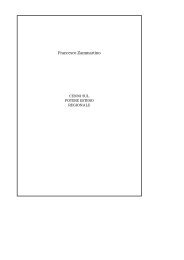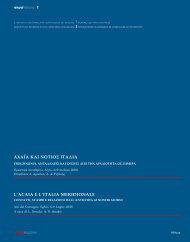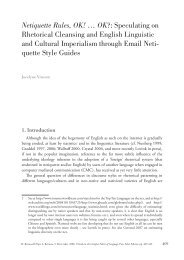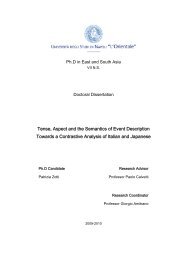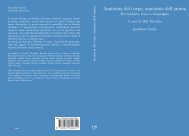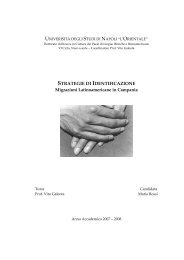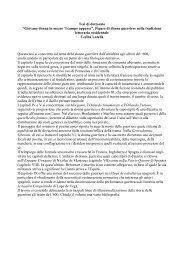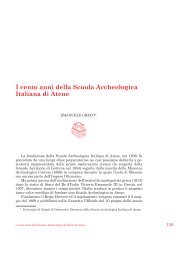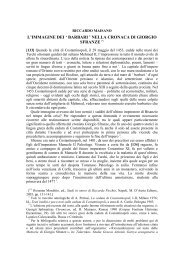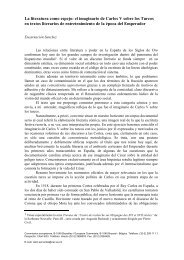Leonardo da Vinci. L'“angeLo incarnato” - OPAR L'Orientale Open ...
Leonardo da Vinci. L'“angeLo incarnato” - OPAR L'Orientale Open ...
Leonardo da Vinci. L'“angeLo incarnato” - OPAR L'Orientale Open ...
Create successful ePaper yourself
Turn your PDF publications into a flip-book with our unique Google optimized e-Paper software.
selves upon the ground adoring and praying to Him whom the<br />
painting depicts and praying for the return of health and for eternal<br />
salvation, just as though the living divi nity were actually present 11 .<br />
At the end of a long speech against the ‘abbreviators’ (Windsor,<br />
RL 19084 r, c. 1509), <strong>Leonardo</strong> attributes to “some region of<br />
India” the custom of distributing the wooden fragments of miraculous<br />
statues to the faithful, who afterwards eat them (but the<br />
other allusion to cannibalism, absolutely unknown in India, could<br />
rather be related to the New World discovered by Colombo):<br />
If you are as you have described yourself the king of the animasls<br />
– it would be better for you to call yourself king of the beasts<br />
since you are the greatest of them all! – why do you not help<br />
them so that they may presently be able to give you their young<br />
in order to gratify your palate, for the sake of which you have<br />
tried to make yourself a tomb for all the animals? Even more I<br />
might say if to speak the entire truth were permitted me. But<br />
do not let us quit this subject without referring to one supreme<br />
form of wickedness which hardly exhists among the animals,<br />
among whom are none that devour their own species except for<br />
lack of reason (for there are insane among them as among human<br />
beings though not in such great number). Nor does this happen<br />
except among the voracious animals as in the lion species and<br />
among leopards, panthers, lynxes, cats and creatures like these,<br />
which sometimes eat their young. But not only do you eat your<br />
children,,, but you eat father, mother, brothers and friends; and<br />
this even not sufficing you you make raidson foreign islands and<br />
capture men of other races and then after mutilating them in a<br />
shameful manner you fatten them up and cram them down your<br />
gullet. Say does not nature bring forth a sufficiency of simple<br />
things to produce satiety? Or if you cannot content yourself with<br />
simple things can you not by blending these together make an<br />
infinite number of compounds as did Platina and other authors<br />
who have written for epicures? And if any be found virtuous and<br />
good drive them not away from you but do them honour lest<br />
they flee from you and take refuge in hermitages and caves or<br />
other solitary places in order to escape from your deceits. If any<br />
such be found pay them reverence, for as these are as gods upon<br />
the earth they deserve statues, images and honours. But I would<br />
11<br />
<strong>Leonardo</strong> <strong>da</strong> <strong>Vinci</strong>, Libro di Pittura. Codice Urbinate lat. 1270 nella Biblioteca Apostolica Vaticana,<br />
ed. by C. Pedretti, Critical transcription by C. Vecce, Florence, 1995, p. 135 (McM 18).<br />
impress upon you that their images are not to be eaten by you, as<br />
happens in a certain district of India; for there, when in the judgment<br />
of the priests these images have worked some miracle, they<br />
cut them in pieces being of wood and distribute them to all the<br />
people of the locality––not without payment. And each of them<br />
then grates his portion very fine and spreads it over the first food<br />
he eats; and so they considr that symbolically by faith they have<br />
eaten their saint, and they believe that he will then guard them<br />
from all <strong>da</strong>ngers. What think you Man! of your species? Are you<br />
so wise as you set yourself up to be? Are acts such as these things<br />
than men should do 12 ?<br />
It is a recurrent theme, in <strong>Leonardo</strong>’s writings: the strong preference<br />
for a vegetarian diet (for example, after the treatise of italian<br />
humanist Platina, recalled by the “infinite compounds” made<br />
possible by the “simples”, that is the salads); and at the same time<br />
the aversion to the carnivore feeding, considered something of<br />
innatural and monstrous, while our body converts itself in a grave<br />
of dead animals: “Man and the animals are merely a passage and<br />
channel for food, a tomb for other animals, a haven for the food<br />
which has been alive. A great portion of bodies that have been<br />
alive will pass into the bodies of other animals; that is, the deserted<br />
tenements will pass piecemeal into the inhabited ones, ministering<br />
to their needs, and carrying with them what is waste. That is<br />
to say, the life of man is formed from things eaten, and these carry<br />
with them that part of man which is dead […] (CA, f. 145 r-a, r-b<br />
[393 r], Richter, § 1293); “Of things which are eaten and which<br />
first are killed. Those who nourish them will be killed by them<br />
and afflicted by merciless death” (CA, f. 370 v-a [1033 r], Richter, §<br />
1295); “Of the Cruelty of Man. […] And their bodies will become<br />
the tomb and means of transit of all the living bodies they have<br />
killed” (CA, f. 370 r-a, r-a bis [1033 v], Richter, § 1296). Vasari also<br />
recalls the great love of <strong>Leonardo</strong> towards the animals, and the<br />
same behaviour is associated to the name of a faithful pupil of his,<br />
Tommaso Masini called Zoroastro 13 .<br />
It is singular that the only document that links together <strong>Leonardo</strong><br />
and India is just about the vegetarian feeding: the letter sent by the<br />
12<br />
<strong>Leonardo</strong>, Scritti, pp. 214-215. The exotic notes about cannibalism come from the Tractato<br />
of Mandeville, owned by <strong>Leonardo</strong>, and from Pliny the Elder, Hist. Nat. VII, 2. Of the Opusculum<br />
de obsoniis ac honesta voluptate by Bartolomeo Sacchi called Platina, <strong>Leonardo</strong> read perhaps<br />
the vernacular translation, Della onesta voluttà e valitudine, printed in Venice in 1487.<br />
13<br />
For Vasari (IV. 21), see Vecce, <strong>Leonardo</strong>, p. 367. Zoroastro “wouldn’t have killed a flea for<br />
everything, and wanted to dress with linen, and not with clothes made of skins of dead<br />
animals” (Scipione Ammirato, Opuscoli, II, Florence, 1637, p. 242).<br />
“Ma p o f El e p h a n ta in In d i a”<br />
371



